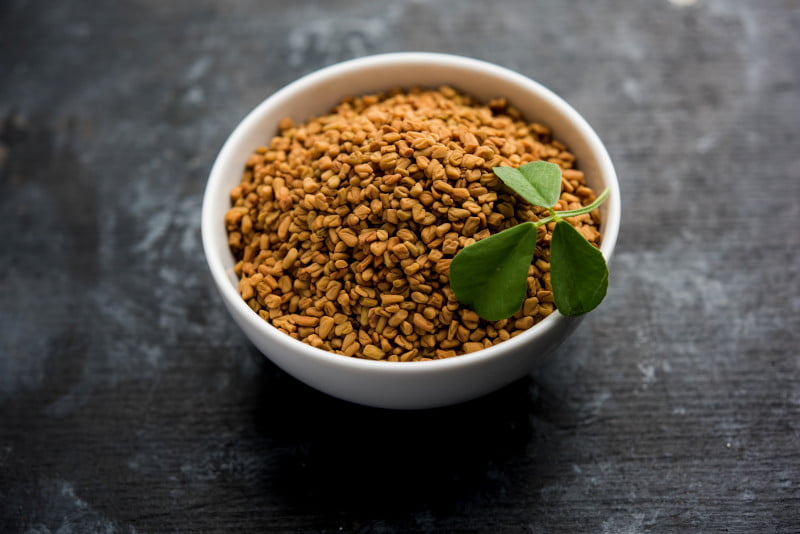Fenugreek has been a staple of traditional Chinese medicine and a fixture in Eastern traditional medicine for millennia, thanks to its many health benefits.
One of the major benefits fenugreek is believed to have is elevating testosterone levels in aging men. If used properly, this can lead to improved sexual function, reduced body fat, and increased muscle mass.
Let's find out if fenugreek does increase testosterone production. We'll look at the benefits of fenugreek supplements and see if they can help you overcome low testosterone as you age.
Does Fenugreek Increase Testosterone?
Fenugreek may help increase free and serum testosterone levels, as well as hinder falling t levels.
Testosterone levels naturally decline with age. Men’s testosterone levels will start to fall in their late 30s and will see a continuous dive thereafter. Fenugreek is believed to stop or hinder this decline.


This is because fenugreek contains compounds called furostanolic saponins, which are believed to increase free testosterone levels by preventing it from breaking down.
This increase in free and serum(1) testosterone levels translate into more red blood cells and better oxygen absorption. This improves every process, from metabolism to libido as well as overall health.
By increasing testosterone, fenugreek has the added benefits of:
- Elevating users' energy levels
- Facilitating weight loss
- Boosting athletic performance(1)
- and improving male vitality, mood, and mental capacity.
Fenugreek has thus become a major ingredient in many of the testosterone booster supplements on the market, allowing users to regulate their hormone levels and stay healthy as they age.
What is Fenugreek?
Fenugreek is a clover-shaped herb primarily found in Western Asia and the Mediterranean. Fenugreek leaves are notable for their complex, maple syrup-like aroma.
On the other hand, fenugreek seeds are rich in fiber, protein, vitamins, and minerals(2). They are often used in spice blends and cosmetics and are particularly notable in Indian cuisine.


However, fenugreek is also famous in traditional medicine. It was most often used(3) to promote breast milk production, treat diabetes, and manage blood sugar.
Fenugreek has gained new popularity in sports and health sciences because scientific evidence supports its ability to boost testosterone and overcome(4) testosterone deficiency.
What is Fenugreek Used For?
Fenugreek has long been associated with alternative medicine, renowned for its anti-inflammatory(5) and antioxidant effects. It's used to treat low testosterone and even eliminate certain cancer cells.
It stimulates insulin(6) and stabilizes glucose metabolism, decreasing blood sugar in diabetic people. It helps lower cholesterol levels, prevents obesity, and strengthens bone health.
That said, fenugreek extract has gained popularity due to its ability to elevate free testosterone levels. It is most commonly served in herbal tea and herbal supplement form.
How to Boost Your Testosterone Levels with Fenugreek Seed
Some of the many benefits of fenugreek come from its ability to increase testosterone and lower estrogen, the female sex hormone, without users needing to undergo hormone replacement therapy.
Several studies have shown that fenugreek supplementation does increase testosterone and athletic ability.


In fact, one randomized controlled pilot study showed fenugreek supplement users(7) markedly improved over the control group in just 12 weeks of use, outclassing them when it came to resistance training.
Elevated testosterone levels also affect sexual function, increasing sperm count and sperm quality.
When combined with a healthy diet high in testosterone-boosting food and healthy fats, fenugreek supplement takers report lower levels(8) of body fat compared to non-users, especially those with poor diets or sedentary lifestyles.
Thus, It is important to combine a consistent dose of fenugreek extract with a testosterone-boosting diet and a steady exercise regimen to encourage higher free testosterone levels.
Other Health Benefits of Fenugreek
Besides reinvigorating its users, the benefits of fenugreek also include its ability to increase breastmilk production in women.
This wondrous herb is also known for its anti-cancer properties, reducing the risk of prostate cancer in particular. It has even shown promise against breast cancer(9).


However, the results of an in vitro study cautions those with hormone-sensitive cancers as fenugreek here has been found to stimulate(10) breast cancer cells.
Fenugreek lowers blood sugar, making it a useful aid for diabetics(11). It has also been used to treat digestive issues and constipation. It even soothes pain.
When found in testosterone boosters, its positive effect on testosterone levels makes it useful for increasing bone mass, strengthening resistance against mental illnesses, and raising alertness.
Are There Any Side Effects of Using Fenugreek?
While fenugreek extract is a fixture in supplements designed to naturally elevate testosterone levels, it has been found to(12) cause diarrhea and bloating, as well dizziness and headaches.
Pregnant people and those with chickpea or peanut allergies may also want to avoid it.
It is best to seek professional medical advice before taking a fenugreek supplement.
This will prevent you from experiencing any untoward side effects, especially when it is taken as an extract and if you have pre-existing medical conditions.
That said, fenugreek has been used in food and medicine for thousands of years. It is safe for general consumption as a spice or as a dietary supplement as long as the recommended dosage is followed.
Are Fenugreek Supplements Safe?
Fenugreek supplements, made primarily of fenugreek seed powder, are regulated by the Food and Drug Administration. They have been deemed safe to be sold on the market, though positive results may vary depending on the brand.


If you are looking to use fenugreek supplements to increase your testosterone levels, it is best to follow suggested dosages and avoid overdosing. This means consuming less than(13) 600 mg of fenugreek a day.
When in doubt, it is best to consult your healthcare provider before consuming supplements rich in fenugreek. While it is exceedingly rare for users to have allergic reactions, side effects like diarrhea are common.
How Much Fenugreek to Use? - Recommended Dosage of Fenugreek
Fenugreek powder is best taken by mouth in 5-10g doses per serving for a period of up to 3 years. As for fenugreek extract, it is best taken at 500-600 mg a day.


These dosages have been found to increase testosterone levels within 8-12 weeks, with several studies providing data on this serving range. That said, you can go up to 1000-2000 mg at most.
Fenugreek is typically taken daily and will usually yield positive results on testosterone levels after 3-6 months of daily consumption.
Frequently Asked Questions (FAQ):
Fenugreek is an herb that provides so many benefits and is a vital component in everything, from testosterone boosters to Garam Masala spice mix.
Its versatility leaves many people with questions about just what it can do.
Let's address some of the most common queries below:
How long does it take to increase testosterone with fenugreek, or does it have a placebo effect?
Studies have shown that fenugreek consumption greatly increases testosterone and exercise performance over a period of 2-6 months compared to control groups that did not take fenugreek. Its effectiveness isn't just placebo.. Rather, its rich chemical composition(14) can really help improve testosterone hormone levels.
Is fenugreek good for male testosterone and libido (sex drive)?
Fenugreek helps men overcome low testosterone, which translates to an increase in sex drive, sperm quality, and overall stamina in bed and at the gym. Thus, users perform better sexually and maintain stronger erections while having the focus and energy they need.
Does fenugreek help increase strength and build muscle mass?
By elevating testosterone levels, fenugreek positively impacts users' strength, stamina, and muscle development. Thus, men recover quicker from fatigue. It also accelerates muscle repair after intense workouts.
Does fenugreek affect hormones?
Fenugreek is highly capable of elevating testosterone levels, hindering estrogen, and regulating the balance of hormone levels in both males and females. Although this reduces the risk of certain cancers like prostate cancer, it may increase the risk of hormone-based cancers like breast cancer.
What does fenugreek do for the female body?
While fenugreek raises testosterone in men, it increases lactation and breast milk production in women. It also treats high cholesterol, heartburn, and other digestive issues, not to mention gout and female baldness. One downside of fenugreek, however, is that it increases the risk of developing breast cancer when consumed in large amounts.
How does fenugreek work as a natural testosterone booster?
Fenugreek contains compounds called furostanolic saponins, which elevate testosterone levels by preventing it from being broken down or converted to estrogen. This, in turn, increases the amount of free testosterone available for the body to use. As such, fenugreek provides the body with more testosterone, which it can use to boost stamina and libido.
Conclusion: Does Fenugreek Increase Testosterone Levels?
Fenugreek extract has been found to increase testosterone levels, allowing users to overcome health conditions such as low testosterone and excess body fat when used consistently at the proper dosages.


The best way to make the most of your Fenugreek dietary supplements is to pair them with a healthy diet and exercise. This will allow you to boost your testosterone levels and maintain muscle strength in your later years.
- Wankhede, Sachin et al. “Beneficial effects of fenugreek glycoside supplementation in male subjects during resistance training: A randomized controlled pilot study.” Journal of sport and health science vol. 5,2 (2016): 176-182. doi:10.1016/j.jshs.2014.09.005↩↩
- Ahmad, Awais et al. “Fenugreek a multipurpose crop: Potentialities and improvements.” Saudi journal of biological sciences vol. 23,2 (2016): 300-10. doi:10.1016/j.sjbs.2015.09.015↩
- Sun, Wenli et al. “Fenugreek Cultivation with Emphasis on Historical Aspects and its uses in Traditional Medicine and Modern Pharmaceutical Science.” Mini reviews in medicinal chemistry vol. 21,6 (2021): 724-730. doi:10.2174/1389557520666201127104907↩
- Mansoori, Anahita et al. “Effect of fenugreek extract supplement on testosterone levels in male: A meta-analysis of clinical trials.” Phytotherapy research : PTR vol. 34,7 (2020): 1550-1555. doi:10.1002/ptr.6627↩
- Pundarikakshudu, Kilambi et al. “Anti-inflammatory activity of fenugreek (Trigonella foenum-graecum Linn) seed petroleum ether extract.” Indian journal of pharmacology vol. 48,4 (2016): 441-444. doi:10.4103/0253-7613.186195↩
- Kiss, Rita et al. “Insulin-Sensitizer Effects of Fenugreek Seeds in Parallel with Changes in Plasma MCH Levels in Healthy Volunteers.” International journal of molecular sciences vol. 19,3 771. 8 Mar. 2018, doi:10.3390/ijms19030771↩
- Hausenblas, Heather A et al. “Efficacy of fenugreek seed extract on men's psychological and physical health: a randomized placebo-controlled double-blind clinical trial.” Journal of complementary & integrative medicine vol. 18,2 445-448. 22 May. 2020, doi:10.1515/jcim-2019-0101↩
- Kumar, Parveen et al. “Fenugreek seed extract inhibit fat accumulation and ameliorates dyslipidemia in high fat diet-induced obese rats.” BioMed research international vol. 2014 (2014): 606021. doi:10.1155/2014/606021↩
- Alrumaihi, Faris A et al. “Methanolic Fenugreek Seed Extract Induces p53-Dependent Mitotic Catastrophe in Breast Cancer Cells, Leading to Apoptosis.” Journal of inflammation research vol. 14 1511-1535. 16 Apr. 2021, doi:10.2147/JIR.S300025↩
- Sreeja, S et al. “In vitro estrogenic activities of fenugreek Trigonella foenum graecum seeds.” The Indian journal of medical research vol. 131 (2010): 814-9.↩
- Gaddam, Arpana et al. “Role of Fenugreek in the prevention of type 2 diabetes mellitus in prediabetes.” Journal of diabetes and metabolic disorders vol. 14 74. 2 Oct. 2015, doi:10.1186/s40200-015-0208-4↩
- Ouzir, Mounir et al. “Toxicological properties of fenugreek (Trigonella foenum graecum).” Food and chemical toxicology : an international journal published for the British Industrial Biological Research Association vol. 96 (2016): 145-54. doi:10.1016/j.fct.2016.08.003↩
- “Fenugreek.” Drugs and Lactation Database (LactMed) [Internet], National Institute of Child Health and Human Development, 2022, www.ncbi.nlm.nih.gov/books/NBK501779/.↩
- Hausenblas, Heather A et al. “Efficacy of fenugreek seed extract on men's psychological and physical health: a randomized placebo-controlled double-blind clinical trial.” Journal of complementary & integrative medicine vol. 18,2 445-448. 22 May. 2020, doi:10.1515/jcim-2019-0101↩
